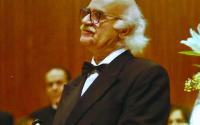13 January 2007Colbert I. King
Forty years ago, Dr. Martin Luther King Jr., whom the nation will honor on Monday, took to the pulpit of Riverside Church in New York City at a meeting organized by Clergy and Laymen Concerned About Vietnam. The date was April 4, 1967, one year before his assassination in Memphis.
King said he was in New York because his conscience had left him no choice. In his speech, "Beyond Vietnam: A Time to Break Silence," King declared: "That time has come for us in relation to Vietnam."
King acknowledged the reluctance of some people to speak out on Vietnam -- the same hesitation some Americans may have today over voicing their concerns about Iraq. People, he explained, "do not easily assume the task of opposing their government's policy, especially in time of war."
But King concluded that too much was at stake. He and the other religious and lay leaders were moved by what the conflict in Vietnam was doing to the United States. Vietnam, King said, was consuming American troops and money like "some demonic, destructive suction tube" even as that war was laying waste to the Vietnamese people and to America's standing in the world.
And on this Martin Luther King Jr. Day, in 2007?
More than 3,000 Americans have been killed in Iraq, while 22,000 others have been wounded. Billions of dollars that could have been invested here at home have been spent there, a lot of it wasted, some of it stolen, plenty of it unaccounted for. And Iraqis in Baghdad, who cowered for decades under a brutal dictator, have been living in the midst of violence almost continuously since Saddam Hussein was deposed.
"We are creating enemies faster than we can kill them" read a bumper sticker in Washington this week.
Now enter George W. Bush -- the president who got America into this debacle through a series of misjudgments that would make Alfred E. Neuman look brilliant. This week Bush announced plans to plop down thousands of additional troops in the middle of a sectarian war and to shell out billions of additional dollars to pacify a war-weary Iraqi population that, truth be told, wants America gone.
Why trust this administration?
Contrary to what Bush and his allies said:
· There were no weapons of mass destruction poised to strike America and her allies.
· A quick defeat of Hussein did not lead to chocolates and flowers in the streets of Baghdad.
· An American invasion did not produce a unified, nonsectarian and Western-oriented Iraq or spark a desire for U.S.-style governance throughout the Arab world.
· De-Baathification and the imposition of a market economy at gunpoint did not usher in a period of tranquility or the flowering of capitalism.
The Bush administration struck first because it had the power to strike and the arrogance to think, foolishly, that it could win and dominate the conquered on the cheap.
King spoke in '67 about "the Western arrogance of feeling that it has everything to teach others and nothing to learn from them." Witness the Bush team in Iraq.
Today they have a bloodbath on their hands to show for their labors, and Iran is on the verge of getting an Iraqi neighbor beyond its wildest dreams.
Yet even now, neoconservatives inside and outside of government are counseling Bush to remain in Iraq for years to prevent the Shiite-dominated regime from collapsing. They also are encouraging him to prepare for battle with Iran and Syria if those countries start meddling in Iraq -- as if they aren't now. With what exactly and for how long we are supposed to do battle with Tehran and Damascus, the militaristic neocon noncombatants in Washington don't say. But then again, they have a tolerance for risk and cost that exceeds that of those who actually do the fighting and dying.
Forty years ago at Riverside Church, people of conscience declared that "a time comes when silence is betrayal." They went beyond using their voices and votes when they agreed to break their silence. They responded, as King had urged, by matching their words with actions. "We are at the moment when our lives must be placed on the line if our nation is to survive its own folly. Every man of humane convictions must decide on the protest that best suits his convictions, but we must all protest," King preached that day.
Yes, this is a different time and a different world. Global terrorism is a sobering reality. And America is on the right side in that war. To not fight back is tantamount to indulging a death wish.
But the first blow in Iraq, which was not a battleground for terrorism, was struck by Bush. He now, stubbornly and in the face of legitimate opposition, proposes to make matters worse.
Remember King and the words: "A time comes when silence is betrayal."
http://www.washingtonpost.com/wp-dyn/content/article/2007/01/12/AR2007011201745.html?sub=AR






